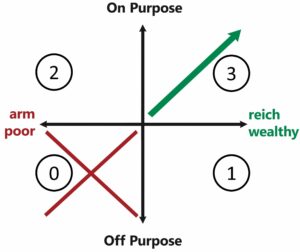Fangen wir mal mit dem Ursprung des Wortes „Coach“ an, denn das kann uns Auswahlkriterien näher bringen. In der ungarischen Stadt Kocs wurden einst die besten von Pferden gezogen „Wagen“ für die höhengestellten Personen gebaut. Da diese aus der Stadt Kocs kamen, entwickelten sich im deutschsprachigen Raum das Wort Kutsche und im englischen das Wort Coach. Ein Personenbus heisst bis heute im englischen Coach: Etwas, was höher gestellte Personen von da, wo sie sind, dahin bringt, wohin sie wollen.
Höhergestellte Personen? Nun, damals konnte sich nur kleine Bevölkerungsschicht diese besonderen Kutschen leisten. Im Coaching geht es natürlich nicht darum, wer höher gestellt ist, jedenfalls nicht als Mensch. Doch ist es immer noch so, dass man sich einen Coach leisten können muss und dass es durchaus normal sein kann, dass der zu Coachende eine wirtschaftlich bessere Stellung im Leben inne hat. Coach bedeutet nach wie vor: Kann ich mit dieser Hilfe weiterkommen, idealerweise dahin, wohin ich will? Im Gegensatz zum Mentor, der schon da ist bzw. erlebt hat, was der Klient erreichen möchte, muss der Coach nicht zwingend da sein, wo der Klient hin will. Der Coach kann insofern manchmal auch nur Wegweiser sein.
Unterschiedliche Formen des Coaching
Am Beispiel der Kutsche kann man deutlich sichtbar machen, welche unterschiedlichen Formen des Coaching es gibt. Zunächst denkt man doch bei der Kutsche daran, dass man sich nur reinsetzen muss und dann ans Ziel gebracht wird.
Doch dies funktioniert weder beim Gesundheits- oder Fitnesscoach – sie können nicht für den Klienten gesunden oder für ihn trainieren – noch im Businessbereich. Dort gilt es zu unterscheiden zwischen Interimsmanager, Trainern und Consultants, die Aufgabenbereiche in der Firma übernehmen. Coaching ist Anleitung zum Tun. Und ein guter Coach verlangt, dass seinen Anweisungen gefolgt wird. Wenn dieses Vertrauensverhältnis nicht besteht, sollte man das Coaching beenden. Bob Proctor sagt so schön: „Wenn ich Dich coache, muss Du tun was ich Dir sage. Ansonsten werde ich Dein Assistent. Und das will ich nicht.“
Stellen wir uns vor, bei Jürgen Klopp als Coach der Fussballmannschaft in Liverpool würden die Spieler den Anweisungen nicht folgen. So käme das Team nie auf die Gewinnerstrasse. Ergo: Der Coach ist nicht selbst auf dem Spielfeld, er gibt Anleitungen, wie das Spiel zu spielen ist.
Der Coach muss also gut sein, um die besten Anweisungen geben zu können. Er muss nicht alles selber besser können. Er muss sein Team, seine Coachees zum Erfolg führen können. Und das ist eine besondere Gabe.
Im englischen heisst Ausbildung education. Das Wort hat einen lateinischen Ursprung und bedeutet „herausholen.“ Ein Coach ist dann gut, wenn er das innere Potential, die einzigartige Fähigkeit des Teammembers, des Coachees wecken, ausbilden und mit zur Vollendung bringen kann. Es darf nichts übergestülpt, aufgepfropft werden. Daher sollte man bei der Wahl des Coaches darauf achten, ob man nach dem Bild des Coaches geschnitzt werden soll, nur dessen Programm kaufen soll, oder ob es wirklich darum geht, die Einzigartigkeit des Klienten zu entwickeln. Das ist meist ein sehr individueller und hautnaher Prozess. Jürgen Klopp könnte seinen Job nicht aus der Ferne und nicht allein mit Videokursen machen.
Es gilt, den Coach nicht allein nach materiellem Erfolg auszusuchen. Es ist doch logisch, auch dahin zu schauen, wie dieser Erfolg gemacht wurde, welche Werte zugrunde liegen. Ich erkläre es weiter unten anhand des Purpose-Quadranten.
Auch haben wir oft über unterschiedliche Bewusstseinsebenen gesprochen. Ob ich nach Spiral Dynamics gehe oder anderen Modellen ist für das grundlegende Kriterium des Bewusstseinslevels gleich. Wichtiger ist: Kann Dein Coach Dich auf einen nächsten Level bringen? Er muss Dir zumindest die richtige Wand für Deine Leiter zeigen können und vielleicht auch die Leiter halten. Ich hatte oft schon Coaches, die ich auf der Ebene ausgewählt hatte, auf der ich gerade war. Viele der sogenannten Top-Coaches auf dem Level waren aber unfähig, mich auf die nächste Ebene zu bringen, da sie diese gar nicht kannten und verstehen konnten. Da hat Coaching mir oft sogar geschadet. Es hat nicht nur unnötig Zeit gekostet (Geld sowieso), sondern oft auch mein Selbstwertgefühl untergraben, da es nicht im Ergebnis wirklich um mich und um meinen Aufstieg ging, sondern um das Nachmachen auf einem Level, den ich verlassen wollte.
Auswahl eines Coaches mit dem Purpose-Quadranten
Daher empfehle ich heute die Auswahl eines Coaches auch anhand des Purpose-Quadranten vorzunehmen. Diesen Chart habe ich hier ja schon häufig benutzt, und an sich ist er selbsterklärend, und ich habe ihn schon häufig benutzt … aber wie funktioniert er für die Coachauswahl?

Geben wir den Quadranten zunächst Nummern. Links unten 0, rechts unten 1, links oben 2 und rechts oben 3. Nun spüre in Dich hinein, in welchem Quadranten Du Dich aufhältst — im Kontext mit dem gewünschten Coaching. Gehen wir mal vom Kontext Business und Karriere aus. Wenn da bisher Purpose und Dein wahres Ich keine grosse Rolle spielt, bist Du wohl in Quadrant 0 oder 1. In welchem von beiden Du bist, kannst Du leicht an Deinem Kontostand festetellen. Musst du hart arbeiten, um zu überleben (0) oder kannst du Dir viel leisten und sogar Monate bis Jahre nicht arbeiten und dennoch leben (1)?
Links unten, Quadrant 0, haben wir rot durchgestrichen, weil wir keinem Menschen wünschen, dort zu leben. Aber es kann passieren – ich bin z. B. dort hineingeboren worden.
Den unteren rechten Quadranten, Quadrant 1, nennen wir intern Investmentbanker-Quadrant. Wenn ich dem Vorurteil entspreche und für Boni alles mache, verrate ich meine Seele.
Oben links, im Quadrant 2, ist man mit seiner Seele gut bis sehr gut in Kontakt. Hier gibt es viele, die Materie ablegen, er heißt Bettelmönch-Quadrant, denn diese verzichten gewollt auf Materie. Hier finden sich auch viele Menschen, die zwar helfen mit ihren Berufen, aber Angst vor Geld und Luxus haben.
Im rechten oberen Quadranten, dem Quadrant 3, sind wir aus dem Dilemma heraus. Hier kann wirtschaftlicher Erfolg mit emotionaler Erfüllung im Einklang mit der Seele gelebt werden. *Purpose driven Profit* heisst das dann bei uns.
Wo befindest Du Dich in dieser Darstellung, und wo möchtest Du hin? Dann bekommst Du schon einen guten Ansatz für Deine Coach-Auswahl.
Anders erklärt: Menschen in Quadrant 0 bleiben meist da. Wenn Sie (was selten geschieht) doch wechseln, dann oft erst nach 1, um erstmal aus der Geldnot zu kommen, der Purpose spielt noch keine dominante Rolle. Ich wechselte auch von 0 nach 1, von arm zu reich. Als ich die fehlende Seelenverbindung realisierte, ging ich dann nach 2, von Off-Purpose zu On-Purpose—aber gleichzeitig von reich zu arm. Radikal hatte ich meine Kanzleien, mein Bürohaus aufgegeben und übertragen. Im Buch *Lieber die ganze Welt gegen mich als meine Seele* ist von diesem Prozess einiges festgehalten.
Man könnte auch von 0 nach 2 gehen. Doch sceint mir dies viel seltener der Fall zu sein.
Von 1 nach 2 habe ich selbst durchlebt. Aber ich habe heute auch Klienten, die von 1 direkt nach 3 gehen, und zwar unter Beibehaltung des wirtschaftlichen Erfolgs von Off-Purpose zu On-Purpose. Man muss nicht erst wieder zur Armut. Transformation setzt keine Armut voraus, nur den Mut, mit einer neuen Weltsicht und neuen Wertvorstellungen die Geschäfte anders zu führen.
Von 1 kann man auch zurück in Quadrant 0 fallen. Von Geld wieder zurück in die Armut, das geschieht häufig genug.
Von 2 nach 0 kommt wohl kaum vor, ich kenne jedenfalls keinen Fall. Von 2 nach 1 und 3 ist möglich. Man kann sich die Seele abkaufen lassen oder man geht aufgrund der Einsicht, dass 2 kein gutes Modell für die Welt ist nach 3.
Nochmals als Übersicht:
| Von … | … nach |
|---|---|
| 0 | 1 und 2, seltenst nach 3 |
| 1 | 0, 2, 3 |
| 2 | 0, 1, 3 |
| 3 | 1 und 2, seltenst nach 0 |
So: Nun finde heraus, in welchem Quadranten du dich aktuell befindest. Dann entscheide, in welchen Quadranten du wechseln möchtest. Und dann wähle sorgfältig Deinen Coach. Ist er in dem Quadrant zuhause, in den Du wechseln möchtest? Die Quadranten sind ja grosse Bereiche. Du kannst z. B. in 3 mehr Wert auf Purpose und weniger auf wirtschaftlichen Erfolg legen. Oder dort sehr grossen materiellen Erfolg haben, aber den Purpose knapp über der Null-Linie.
Zunächst ist das Wichtigste, dass Deine Coaches immer auf dem Level sind, in den du möchtet. Wenn du dann dort bist, kannst Du dort wieder nach dem nächsten Coach schauen, der Dich weiterbringt. Manchmal muss man Berater wechseln, wenn man selber weiterwachsen will, es der Berater aber nicht tut.
Wenn Du überdurchschnittliche Lebensqualität haben möchtest, empfehle ich immer einen Coach. Du wählst ihn gezielt aus, wie oben beschrieben? – Sehr gut! Mit Top-Kutschen kommst Du schneller, bequemer und sanfter zum gewünschten Ziel.
